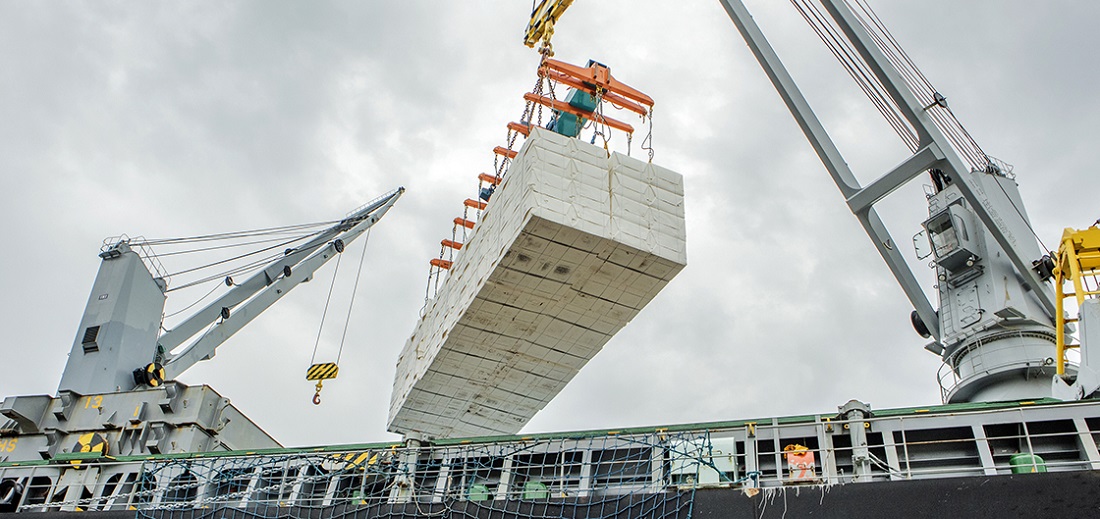
China Emerges as Largest Buyer of Brazilian Pulp
Nov, 29, 2024 Posted by Gabriel MalheirosWeek 202445
China is the world’s largest pulp market, accounting for 42% of global consumption. According to the Brazilian Tree Industry Association (Ibá), which represents companies in the sector, China was the destination for 43% of Brazilian pulp exports from January to September 2024. These exports totaled $4.97 billion, underscoring China’s importance not only as the primary buyer but also as a growth engine for the industry.
“China is not only our main market but also the one with the most significant growth potential,” said Leonardo Grimaldi, Suzano’s Executive Vice President of Commercial, Logistics, and Pulp Operations. Suzano is Brazil’s leading pulp producer and exporter, with about 40% of its exports directed to China.
“In the U.S. and Europe, demand increases by less than 1% annually, whereas in China, it has grown at an average of more than 5% over the past decade,” Grimaldi noted, referring to short-fiber pulp, where Brazil is the global leader in production. “The Chinese market is the driving force behind this growth,” added Rodrigo Libaber, Commercial and Logistics Director at Eldorado Brasil Celulose, which sends approximately 45% of its production to China.
Libaber attributes the rising Chinese demand largely to increased sales of hygiene and household paper products, which are fueled by urbanization and GDP growth.
The chart below illustrates the rising demand for cellulose paste exports seen in Brazilian maritime ports to China in the period that goes from January to October 2021 to its corresponding months in the following years. The data comes from DataLiner, a Datamar intelligence product.
Cellulose Paste to China | Jan-Oct 2021 vs Jan-Oct 2024 | WTMT
Source: DataLiner (click here to request a demo)
China’s importance is reflected in investment strategies across the sector. “No player launches a new project without a deep focus on China,” Grimaldi emphasized. He cited China’s demand as a critical factor in Suzano’s R$22.2 billion ($4.5 billion) investment to expand production capacity by 20%, reaching 13.5 million tonnes. This expansion includes a new plant in Ribas do Rio Pardo, Mato Grosso do Sul, inaugurated in July, as well as investments in logistics and plantation areas.
Similarly, Eldorado invested around R$500 million ($102 million) in 2023 to open a new terminal at the Port of Santos, facilitating pulp shipments from its plant in Três Lagoas, Mato Grosso do Sul. “The new terminal positions us for a new growth cycle, with China as our primary market,” Libaber explained. Eldorado plans to expand its current 1.8 million tonnes of annual capacity with an as-yet undisclosed project.
Both Suzano and Eldorado maintain offices in Shanghai, ensuring close proximity to their clients. “We aim to be perceived as a local player, offering services in our customers’ language, culture, and time zone,” Libaber said.
Suzano also operates a technological center in Shanghai, complete with laboratories for testing and product development. This facility has been instrumental in helping Chinese clients adopt 100% short-fiber pulp for toilet paper production, a practice common in Brazil that eliminates the need for more expensive long-fiber pulp.
The company has also partnered with China’s Ningbo Actmix Rubber Chemicals to use eucalyptus biomass as an alternative to fossil-based chemical additives and antioxidants. This move reflects a growing awareness of sustainability in the Chinese market. “The government has significantly amplified its rhetoric on carbon footprint reduction,” Grimaldi observed.
While China currently lags behind Europe in sustainability standards, global pressures are driving change. “Eventually, these commitments will impact the Chinese market,” said Pedro Henrique Rodrigues, International Relations Advisor for the Brazilian Confederation of Agriculture and Livestock (CNA).
Libaber echoed this sentiment, noting that environmentally conscious consumers, particularly in Europe, are setting trends likely to influence Chinese demand. Additionally, he pointed to a generational shift in Chinese businesses, as younger heirs—many educated in Europe and the U.S.—bring sustainability priorities into their management practices.
This evolving outlook aligns with Brazil’s competitive edge. Major Brazilian pulp exporters have refrained from planting in deforested areas since 1995 and preserve nearly 7 million hectares of native forests, reinforcing their appeal as sustainable suppliers in an increasingly eco-conscious global market.
Source: Valor Econômico
Original reporting: https://valor.globo.com/publicacoes/especiais/revista-brasil-china/noticia/2024/11/29/china-a-grande-freguesa-da-celulose-brasileira.ghtml
-
Economy
May, 27, 2022
0
Paraguay’s imports grow 27.2% in the first four months of 2022
-
Ports and Terminals
Nov, 13, 2024
0
Itaqui Grain Terminal to Receive R$ 1.5 Billion in Investments
-
Grains
Apr, 22, 2024
0
Rabobank Report Warns of Brazil’s Port Capacity Strain Amid Soaring Grain Exports
-
Ports and Terminals
Aug, 11, 2020
0
Paraná Ports colaborate with Fundación Valenciaport to build a ‘smart port’

